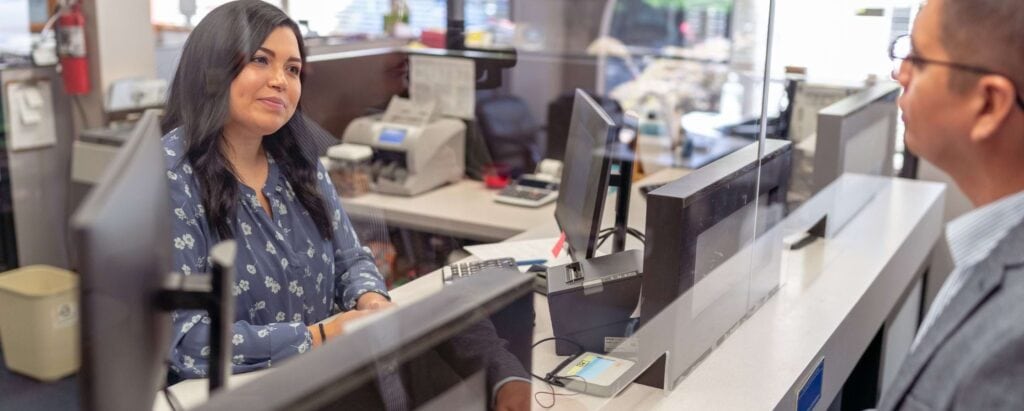Disclosure: This post may contain affiliate links. If you click on a link I may make a small commission at no extra cost to you. You can read the full disclosure here.
Last Updated on July 16, 2023 by Chris Panteli
How Many Jobs Are Available In Commercial Banks
Are you intrigued by the intricate world of finance? Do you possess a knack for numbers, analytical thinking, and building relationships?
Would you like to find a career offering both excellent financial rewards and the chance for career advancement?
If so, a career in commercial banking might be the perfect fit for you. Whether you’re a recent graduate or a professional seeking a career change, stepping into the world of commercial banking opens a world of opportunities for personal growth and professional success.
In this post, you’ll get all the answers you need about starting a career in commercial banks. That includes how many jobs are available in commercial banks and the best paying jobs.
- How Many Jobs Are Available In Commercial Banks
- What are Commercial Banks
- Types of Commercial Banks Jobs
- Skills Needed for Commercial Bankers
- Pros and Cons of Working in Commercial Banking
- Things to Know When Choosing Commercial Banking as a Career
- How Much do Commercial Banking Professionals earn
- Is Commercial Banking A Good Career Path
- How Many Jobs Are Available In Commercial Banks
What are Commercial Banks

Commercial banks are financial institutions that provide a range of services to individuals, businesses, and other organizations. They are an integral part of the banking system and play a crucial role in the economy. Here are some key functions of commercial banks:
- Accepting Deposits
- Providing Loans and Credit
- Payment Services
- Investment Services
- Foreign Exchange Services
- Financial Advisory Services
- Safekeeping of Valuables
- Clearing and Settlement
- Monetary Policy Implementation
Types of Commercial Banks Jobs
Commercial banks offer a wide range of job opportunities across various departments and roles. Here are some common types of jobs found in commercial banks.
Bank Teller/Customer Service Representative
These roles involve interacting directly with customers at the bank branch. Teller duties include processing deposits, withdrawals, and credit card transactions, while customer service representatives assist customers with their banking needs and address inquiries or issues.
Loan Officer
Loan officers assess loan applications, evaluate borrowers’ creditworthiness, and determine the terms and conditions of loans.
Portfolio Manager/Personal Banker
Portfolio managers or personal bankers build and maintain relationships with high-net-worth individuals, businesses, or corporate clients. They provide personalized financial planning advice, offer banking solutions, and assist clients in achieving their financial goals.
Financial Analyst
Financial analysts work in departments like risk management, credit analysis, or investment banking. They analyze financial data, assess creditworthiness, evaluate investment opportunities, and provide recommendations for decision-making.
Compliance Officer
Compliance officers ensure that the bank adheres to financial services regulatory requirements, internal policies, and legal standards. They monitor and assess compliance risks, implement compliance programs, and educate bank employees on regulatory obligations.
Operations Manager
Operations managers oversee the day-to-day operations of a bank branch or specific departments. They coordinate activities, ensure efficient processes, and manage staff.
Treasury Specialist
Treasury management looks after a bank’s liquidity, cash flow, and risk management. They analyze and execute financial transactions, monitor market trends, and develop strategies to optimize the bank’s financial position.
Credit Analyst
Credit analysts assess the creditworthiness of borrowers, review loan applications, analyze financial statements, and prepare credit reports.
Investment Banker
Investment bankers work in the bank’s investment banking division and specialize in advising clients on mergers and acquisitions, capital raising, initial public offerings (IPOs), and other financial transactions.
Risk Manager
Risk managers identify and manage various risks faced by the bank, including credit risk, market risk, operational risk, and regulatory compliance risk. They develop risk management strategies, implement risk assessment frameworks, and ensure the bank’s risk exposure remains within acceptable limits.
Skills Needed for Commercial Bankers

Commercial bankers require a combination of technical skills, industry knowledge, and soft skills to be successful in their roles. Here are some skills that are important for commercial bankers.
Financial Analysis
Commercial bankers need strong financial analysis skills to assess the creditworthiness of borrowers, analyze financial statements, evaluate loan applications, and make informed lending decisions.
Credit Evaluation
The ability to evaluate credit risk is crucial for commercial bankers. They should have a deep understanding of lending criteria, collateral valuation, and industry-specific risk factors.
Banking and Financial Products Knowledge
Commercial bankers should possess comprehensive knowledge of banking and financial products and services offered by their institution. Knowledge of industry regulations and compliance requirements is also important. For example, a mortgage banker must understand all relevant mortgage regulations.
Keeping up-to-date with the Federal Deposit Insurance Corporation (FDIC) is a key way to remain informed.
Relationship Building
Building and maintaining relationships with customers is a key skill for commercial bankers. They should be able to communicate effectively, understand customer needs, and provide personalized solutions. Strong interpersonal and networking skills are essential for establishing trust and fostering long-term client relationships.
Sales and Business Development
Commercial bankers often have sales targets and are responsible for acquiring new customers and growing the bank’s business. They should possess effective sales and business development skills, including prospecting, negotiating, and closing deals.
Analytical Thinking
Commercial bankers must be skilled at analyzing complex financial data, identifying patterns, and making data-driven decisions. They should have a keen eye for detail and the ability to identify potential risks or opportunities based on their analysis.
Risk Management
Commercial bankers need to have a solid understanding of risk management principles and practices. They should be able to identify and assess risks associated with lending, develop risk mitigation strategies, and ensure compliance with regulatory requirements.
Communication Skills
Effective communication skills are essential for commercial bankers to interact with customers, colleagues, and other stakeholders. They should be able to articulate complex financial concepts in a clear and concise manner, both verbally and in writing.
Problem-Solving
Commercial bankers, such as a branch manager, encounter various challenges and problems in their day-to-day work. Strong problem-solving skills help them identify issues, analyze options, and develop creative solutions to address client needs or resolve banking-related issues.
Technology Proficiency
As the banking industry increasingly relies on technology, commercial bankers should be comfortable using banking software, financial modeling tools, customer relationship management (CRM) systems, and other relevant technologies.
Pros and Cons of Working in Commercial Banking

Working in commercial banking can offer both advantages and disadvantages. Here are some pros and cons of working in this field.
✅ Pros
✅ Job Stability
Commercial banking is a stable industry, and banks are often seen as secure employers. The demand for banking services remains relatively constant, providing employees with a sense of job security.
✅ Career Opportunity
Commercial banks typically have well-defined career paths and offer opportunities for advancement. With experience and proven performance, individuals can progress to higher positions with increased responsibilities and better compensation.
✅ Learning and Development
Commercial banks invest in training and development programs to enhance employees’ skills and knowledge. Working in a bank allows individuals to gain exposure to various aspects of banking, such as credit analysis, risk management, and financial products, fostering continuous learning and professional growth.
✅ Compensation and Benefits
Commercial banking jobs often come with competitive salaries and benefits packages. Investment banks may offer bonuses, performance incentives, retirement plans, healthcare benefits, and other perks to attract and retain talented professionals such as a financial manager.
✅ Transferable Skills
The skills acquired in commercial banking are often transferable to other sectors of the financial industry.
❌ Cons
❌ Stress
Commercial banking can involve demanding workloads, especially during peak periods or when dealing with complex transactions. Meeting targets, managing multiple client relationships, and handling time-sensitive tasks can create high levels of stress and pressure.
❌ Long Working Hours
Banking operations often require employees to work long hours, including evenings and weekends. Deadlines, client demands, and regulatory requirements may contribute to a demanding work schedule, which can impact work-life balance.
❌ Regulatory Requirements
Commercial banks operate under strict regulatory frameworks, which can lead to increased paperwork, compliance-related tasks, and additional reporting obligations. Staying updated with changing regulations and ensuring compliance can add complexity to job responsibilities.
❌ Limited Work-Life Balance
The demanding nature of commercial banking can result in a challenging work-life balance. Long hours, tight deadlines, and the need to be available for client requests can impact personal life and leisure time.
Things to Know When Choosing Commercial Banking as a Career
Choosing commercial banking as a career requires careful consideration and understanding of the industry. Here are some important things to know when considering a career in commercial banking.
Industry Overview
Gain a thorough understanding of the commercial banking industry, its structure, and the role it plays in the economy. Research the key players, market trends, and the regulatory environment that governs banking operations.
Job Roles
Consider the various job roles within commercial banking to identify the areas that align with your skills, interests, and career goals. Examples include relationship management, credit analysis, risk management, operations, or investment banking.
Qualifications and Skills
Determine the educational qualifications and skills necessary for the specific roles you are interested in. Many commercial banking positions require a bachelor’s degree in finance, business administration, economics, or a related field.
Career Progression
Understand the potential career progression and development opportunities for a commercial banker. Research the typical career paths, advancement prospects, and additional qualifications or certifications that can enhance your professional growth.
Work-Life Balance
Evaluate the work-life balance associated with commercial banking. Consider the typical working hours, demands during peak periods, and the potential impact on your personal life. Determine if you are comfortable with the level of commitment required.
Networking
Recognize the importance of networking in commercial banking. Building professional connections with financial consultants and others in the industry can enhance your career prospects, provide mentorship opportunities, and offer valuable insights into the industry. Attend industry events, join professional associations, and connect with professionals already working in the field.
Continuous Learning
Commercial banking is a dynamic industry, and staying updated with industry trends, regulations, and technological advancements is crucial. Emphasize the importance of continuous learning and seek opportunities for professional development, such as attending training programs, pursuing certifications, or participating in industry conferences.
How Much do Commercial Banking Professionals earn

The salary of commercial banking professionals can vary depending on factors such as job role, previous experience, location, and the size of the bank. Salaries can also be influenced by competitive market conditions and industry trends.
Employers within commercial banking are an equal opportunity employer. That means you should have no barriers to starting your career as long as you have the necessary skills and experience.
In the US the average salary for commercial banking is $98,438.
Best Paying Jobs in Commercial Banking
- Bank Teller/Customer Service Representative: The average annual salary for bank tellers or customer service representatives in the US is $106,093.
- Loan Officer: Loan officers, depending on their experience and performance, can earn an average annual salary of $181,832.
- Relationship Manager/Personal Banker: Relationship managers or personal bankers who manage client relationships, particularly in commercial or corporate banking, can earn an average annual salary of $41,604.
- Financial Analyst: Financial analysts working in commercial banking can earn an average annual salary of $74,756.
- Risk Manager: Risk managers in commercial banking, responsible for managing and mitigating risks, can earn an average annual salary of $121,126.
- Compliance Officer: Compliance officers, responsible for ensuring regulatory compliance within the bank, can earn an average annual salary of $124,855.
- Operations Manager: Operations managers in commercial banking can earn an average annual salary of $70,739.
Is Commercial Banking A Good Career Path
Commercial banking can be a good career path for individuals who have an interest in finance, enjoy working with numbers, and possess strong analytical and interpersonal skills. Here are key reasons that commercial banking may be a good career path for you.
- Job security
- Career growth opportunities
- Continuous learning and development
- Earn a competitive salary and benefits
- Create your own network with experienced institutional investors and other industry professionals
- Develop transferable skills
Ultimately, whether commercial banking is a good career path for you depends on your individual interests, skills, and career goals.
How Many Jobs Are Available In Commercial Banks
The number of jobs available in commercial banks can vary based on several factors, including the size of the bank, its location, the state of the economy, and industry trends.
Commercial banks employ a wide range of professionals in various roles and departments to support their operations and serve their customers.
Labor statistics collected by one report estimate that over 2 million people are employed in the commercial bank sector.
You now know how many jobs are available in commercial banks, salary expectations, and the key skills you’ll need.
What next? Now it’s time to search for your first job role in commercial banks. Start today by contacting recruiters to set up a job alert for your dream job opening.
Recommended: How Many Jobs Are Available In EDP Services







